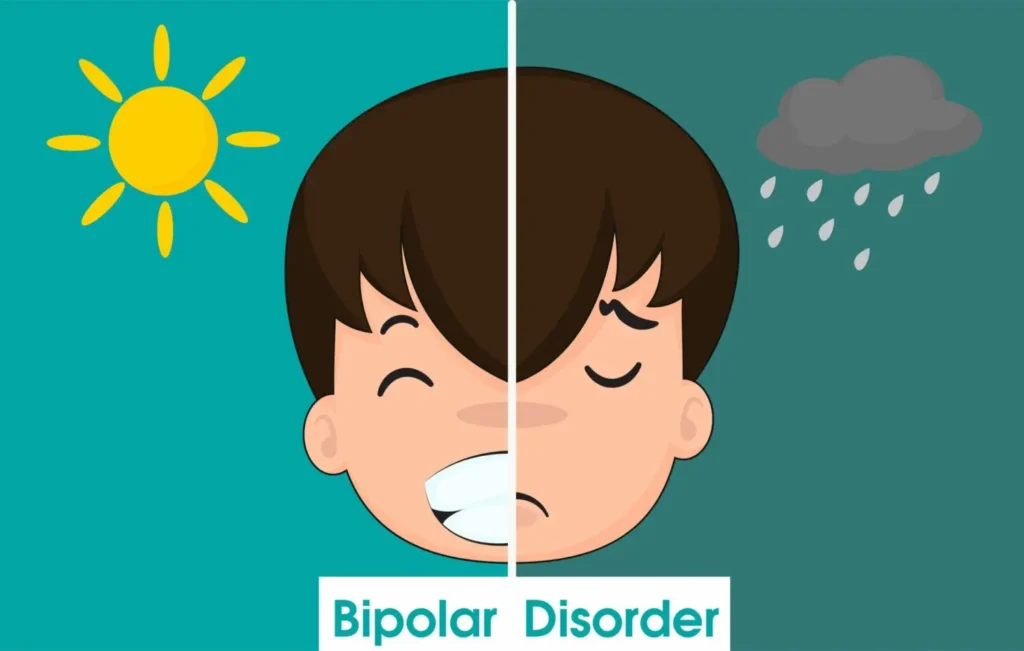Bipolar disorder, formerly known as manic-depressive illness, is a mental health condition characterized by extreme mood swings that include emotional highs (mania or hypomania) and lows (depression). These shifts can affect sleep, energy levels, judgment, behavior, and the ability to think clearly. Understanding this disorder is crucial for anyone experiencing its symptoms or caring for someone who is.

Types of Bipolar Disorder
There are several types of bipolar disorder, including:
–Other Specified and Unspecified Bipolar and Related Disorders: Bipolar disorder symptoms that do not match the three categories listed above.
–Bipolar I Disorder: Characterized by manic episodes that last at least seven days or by manic symptoms so severe that immediate hospital care is needed. Depressive episodes occur as well, typically lasting at least two weeks.
–Bipolar II Disorder: Defined by a pattern of depressive episodes and hypomanic episodes, which are less severe than the full-blown manic episodes seen in Bipolar I Disorder.
–Cyclothymic Disorder (Cyclothymia): Periods of hypomanic symptoms as well as periods of depressive symptoms lasting for at least two years (one year in children and adolescents), but the symptoms do not meet the diagnostic requirements for a hypomanic episode and a depressive episode.
What Are the Symptoms?
Bipolar disorder manifests in various ways, and symptoms may vary from person to person. The two primary phases are:
Manic Phase:
-Increased energy, activity, or restlessness
-Unusual talkativeness or rapid speech
-Racing thoughts or jumping from one idea to another
-Decreased need for sleep
-Impulsive behaviors, such as spending sprees or risky sexual encounters
Depressive Phase:
-Feelings of sadness, emptiness, or hopelessness
-Loss of interest or pleasure in most activities
-Fatigue or loss of energy
-Difficulty concentrating or making decisions
-Thoughts of death or suicide
When to Seek Help
Recognizing when to seek professional help is vital for managing bipolar disorder effectively. Here are some signs that it may be time to consult a doctor:
-Persistent Mood Changes: If mood swings are frequent and disruptive, impacting daily life, it’s essential to reach out for help.
-Risky Behaviors: Engaging in reckless activities during manic phases can lead to harmful consequences.
-Suicidal Thoughts: If you or someone you know is having thoughts of self-harm or suicide, seek immediate professional assistance.
Interference with Daily Life: If mood changes are affecting relationships, work, or other aspects of life, professional support can provide guidance.
The Treatment Process
Bipolar disorder is a lifelong condition, but with proper treatment, individuals can lead fulfilling lives. Treatment typically involves a combination of therapies:
Medication:
Mood Stabilizers: These are often the first line of defense against mood swings.
Antipsychotics: These can help manage manic episodes.
Antidepressants: Used cautiously, as they can sometimes trigger manic episodes.
Psychotherapy:
Cognitive Behavioral Therapy (CBT): This helps individuals identify and change negative thought patterns and behaviors.
Family Therapy: This can improve communication and support within families.
Psychoeducation: Educating patients and families about the disorder can empower them to manage symptoms effectively.
Lifestyle Changes:
Regular Exercise: Physical activity can help stabilize mood.
Healthy Diet: A balanced diet supports overall mental health.
Sleep Hygiene: Maintaining a regular sleep schedule is crucial for mood stability.
Conclusion
Bipolar disorder is a complex condition, but with the right support and treatment, individuals can manage their symptoms and lead productive lives. If you or someone you know is experiencing signs of bipolar disorder, do not hesitate to seek help from a healthcare professional. Early intervention can make a significant difference in the journey toward stability and wellness.
